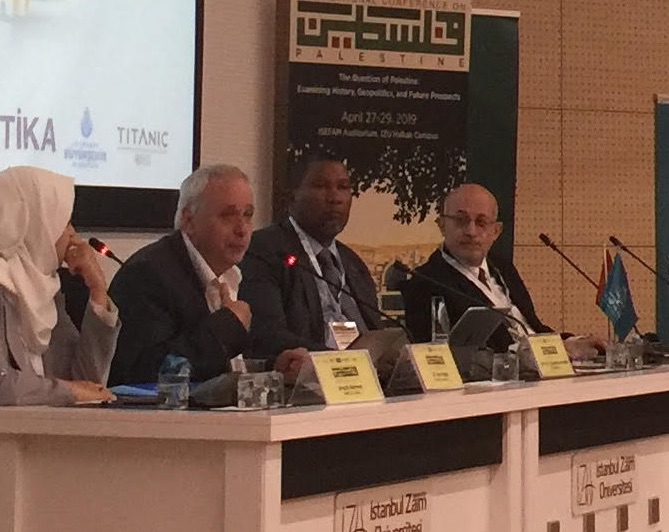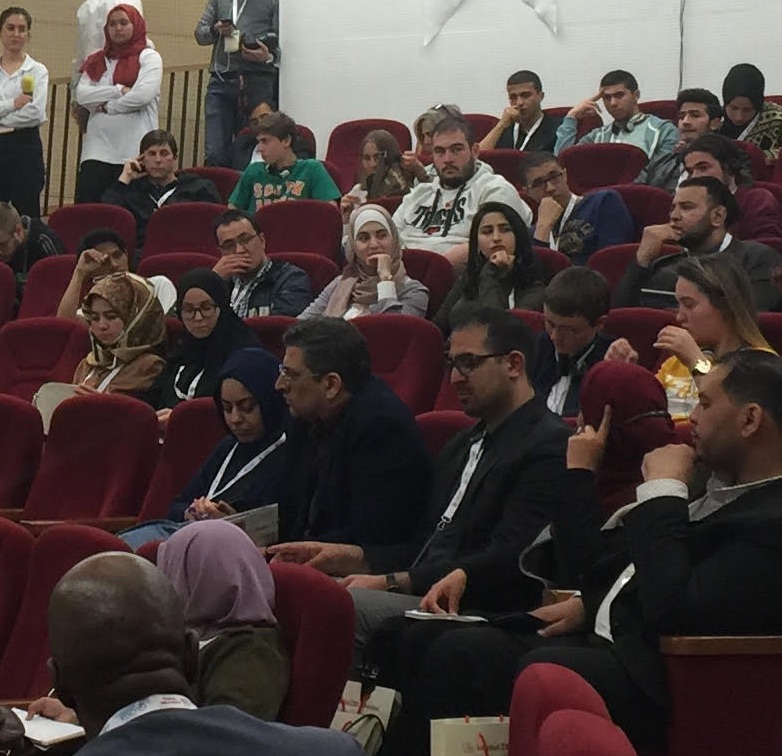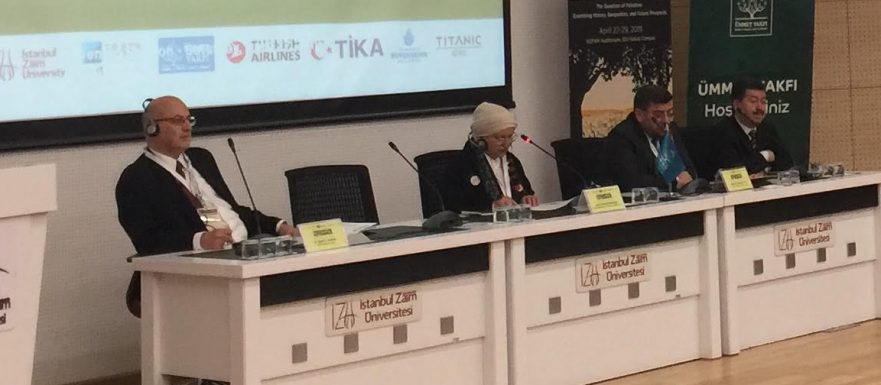by Yousef Aljamal
[Editorial note: Turkey has hosted a number of notable conferences on Palestinian issues in recent years. Just World Ed is fortunate that Palestinian social activist Yousef Aljamal was able to attend this one and send us this report from it.]
Hundreds of activists, students, and scholars from all around the world took part in a conference “The Question of Palestine: Examining History, Geopolitics, and Future Prospects” that was held by the Center for Islam and Global Affairs (CIGA) at Istanbul Zaim University, April 27-29.
What follows are some highlights of what was said by some of the conference speakers who are not often quoted in US publications. (The full bios of all the speakers can be found here.)
Israeli historian Ilan Pappe:
The main problem with Israel is that it is not just an apartheid state, but it is also a settler-colonial state… Settler colonialism is a version of colonialism, and using this analysis reveals more about Israel. When it comes to analyzing settler colonialism, a group of young Palestinian academics contributed immensely…
The movement of these Europeans [the Zionist settlers] was into the land of another people. In the eye of settlers, it was a salvation project, so their interests clashed– that of the settlers and the empire. That’s why when the War of Independence took place in the U.S., it was between settlers and the British, and in Palestine it was between settlers and the British.
They attempt to erase memory: This is an important part of settler colonialism. The history of Zionism is an an incomplete project of settler colonialism, including homes demolitions and the Israeli national law of 2018. If it is complete, it goes on and on, either until the settler colonial project is defeated or the population disappears.
The Zionist Movement studied the land laws of Ottoman Empire and the British laws. They could not solve the demographic issue. The heart of Israeli strategy of 2019 is to have the land without the people.
Israel cares about its image, so they try to commit their crimes clandestinely, during 1948 for example. They try to sell their occupation as peace talks.
After 1967, there were two schools of thoughts. The liberal Zionist idea of solving this balance between geography and demography. So we had the two-state solution. The second school says we should continue controlling the demographic reality without threatening our geographic gains and that’s Israel’s version in 2020. 150,00-170,000 Israeli Jews are directly involved in controlling the Palestinian society.
The civil society such as the BDS movement want to send a message to Israel that this reality that most Israeli Jews think is fine can’t continue. If we are lucky, in 10 years, if we see a United Palestinian National Movement, we will have a freed Palestine.
South African parliamentarian Zwelivelile Mandela:

On the 27th of April 25 years ago, Nelson Mandela joined of millions of South Africans to cast their vote in the first democratic elections. It is the result of the dear sacrifices of men and women throughout our struggle for freedom.
Allow me to pay tribute to 6 million Palestinian refugees who were denied the right to return to their land. We had no such issue on such a large scale like this.
It is glorious that as we celebrate freedom in South Africa, a young team of Palestinians from Khan Younis visited South Africa for a football tournament. They received a hero’s welcome. When Nelson Mandela visited Gaza in 1995, Mandela said our freedom is incomplete without the freedom of the Palestinians.
Israel is an apartheid state. One has to view the shrinking map of Palestine to understand what I mean.
I want Palestinians in exile to follow this example. Our diaspora became our ambassadors. The work of BDS has to be applauded in this respect…
Apartheid Israel has its date with destiny.
CIGA Director Dr. Sami Al-Arian:
Jews lived for centuries in peace with other Arab tribes. Jewish communities in Europe were discriminated against. European Jews lived in such miserable conditions that they had to have their own places.
Within decades, many Jews assimilated. Zionism has convinced that Europe is no longer safe for them. It was completely a European experience. These experiences had no equivalent in the Muslim world. When Jews were kicked out of Spain in the 15 Century, they lived in Palestine and Istanbul.
In order to achieve peace in Palestine and the world, the Zionist project must be defeated and Zionist institutions must be dismantled. There is a difference between the Zionist institutions and Jewish institutions.
Veteran Palestinian rights activist Dr. Salman Abusitta:
Israel can’t claim a meter of land that is not acquired without sheer military force. The French did not need deception in Algeria nor did the British in India, but the Zionists needed it because their project is against history.
Although Palestinians lost their land and geography but it remained in their hearts.
The war against Gaza never stopped since 1948. In 1956, a huge massacre was committed against Gaza by Israel where hundreds of Palestinians were massacred.
It was too painful to see people in the West dancing in the streets or London and New York. It was in Jordan and Lebanon that the resistance to Israel started.
The UN has said the Palestinian people have the right to gain their rights by all means possible. The UN also recognized Zionism as a form of racism, which was repelled later on.
Fifty-five peace proposals, we hear from Trump, were thrown at Palestinians and all these proposals are against international law. They were advanced by western countries and then by the Israelis themselves, then Palestinians became part of it, then we had the biggest disaster of Oslo, the big hoax.
The first thing to do is to reverse the crime of ethnic cleansing by implementing the right of return.
Palestinians in the diaspora held conferences to assert their right of return, in Boston, London, Beirut. Palestinian activists are active in groups such as SJP.
Zionism must be abolished. Any one who thinks that co-existence with Zionism is possible is mistaken.
People in the end will triumph because justice will prevail.
Palestinian historian Dr. Saleh Abdel Jawad:
We have the issue of security coordination where Palestinians provide security services to Israel in return for nothing.
When people demonstrated in the West Bank to protest the bombing of Gaza, [Palestinian] security forces broke their hands. Some of them were my students at Bir Zeit University. That’s why it is difficult to have a third intifada!
Policy specialist Hani Almasri
Realizing the Palestinian national project requires a long historical phase. It is impossible to realize it now or throughout one phase.
After 1973, some Palestinians started saying that the train of peace process has left the station and and whoever does not get off the station will get lost. Discussions began on the possibility of establishing a Palestinian state on any part of Palestine based on a political resolution. Then, further concessions were made.

Despite the difficult circumstances Palestinian rights should not have been given up.
One dangerous thing that happened was recognizing Israel’s right to exist. There is a difference between recognizing Israel and recognizing its right to exist. American President Truman was lobbied to recognize Israel’s right to exist, but he refused…
The current Israeli battle is to annex the West Bank and to keep Gaza separated from it and under siege.
Womens Studies leader Dr. Islah Jad
Participation of women in the labor force went down following the occupation of the Gaza Strip and West Bank.
Through their activism, women managed to challenge the prevailing gender order… But following the Oslo Accords, many of the Palestinian feminists were incorporated into the PA.
Ethic studies expert Dr. Loubna Qutami
Oslo was a Nakba for the Palestinians. Frank Fanon says every generation has to fulfill its mission. For Palestinians there are two generations, the revolution generation and the Oslo generation.
In the 1950s, Abu Iyad, one of the Fatah founders and a student leader, spoke about the Nakba as “a gap in our souls.”
Student leaders such as Yasser Arafat and Abu Iyad followed the slogan of putting Palestine on the map.
The paradox was when, at a time Arab youths were talking about revolutions in 2011, Palestinian youths were calling for unity between Hamas and Fatah, which is re-establishing the existing order.
Today, Palestinian youths are rising everywhere, prisoners on hunger strike, students on campus, and Palestinians in the diaspora.
Film-maker Rawan Al-Damen
The four pillars of Palestine media strategy are:
- Producing more. We lack more materials on Palestine in different languages.
- To make the materials, once produced, accessible.
- To use the materials in advocacy work.
- Networking.
Author and journalist Ramzy Baroud:
Palestine and Palestinians have been excluded from their own narrative. I come from a refugee camp in Gaza and this is our narrative. Our narrative has been a negation of the Israeli narrative. Hamas, Fatah, PFLP are part of our narrative and society…
A Palestinian narrative that does not include Palestinians is not our narrative.
Rights activist and author Frank Barat:
We have seen how the Israeli government led by Netanyahu has been taking actions to annex the West Bank.
On one side, we have global Israel providing services and experts and technology on how to build walls, and on the other side we have global Palestine, with the growth of the Palestine solidarity movement and the BDS movement that are shifting the discourse at US congress and Europe.
The BDS movement could play a great role in the movement!

